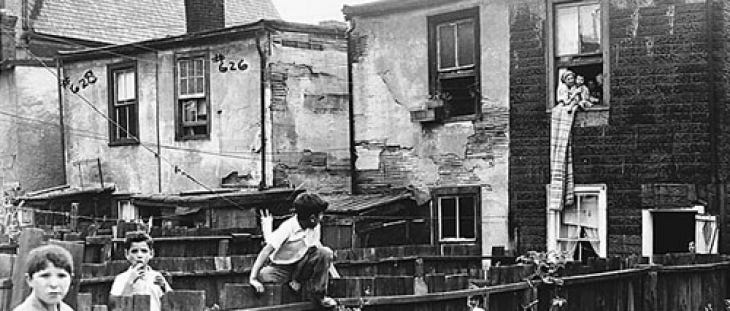Restrictive zoning and gentrification go hand in hand
When you can't add more housing, rents have to rise to push people out
People often think of “gentrification” as “new buildings” - they’re expensive, and that’s what causes higher-income people to move into a lower-income neighbourhood, right?
In fact it’s almost exactly the opposite: lack of new housing results in gentrification, i.e. high-income households moving into lower-income neighbourhoods and displacing lower-income households.
Our examination reveals that, in many metro areas, high housing costs — resulting from a lack of available housing — cause affluent buyers to look for homes in low- and moderate-income (LMI) neighborhoods. That means cities’ housing supply can determine how fast gentrification may occur.
In metro areas with a high price-to-income ratio, even high-income borrowers are stretching to purchase a home, and they are increasingly venturing into LMI areas. Middle- and low-income borrowers are finding it increasingly difficult to buy in LMI areas, as prices for low-price homes have increased faster than prices for more expensive homes. These areas with a high price-to-income ratio tend to have a lower homeownership rate than the national average. This is particularly true in California metro areas, but the New York and Miami areas also show signs of high-income movement in LMI neighborhoods and somewhat depressed overall homeownership rates.
For example, a recent story from Toronto:
Toronto is in the midst of a housing crisis that experts have pinned on a lack of supply, but it's damn near impossible to get anything built when rich people reside nearby.
Residents of the city's wealthy Cabbagetown neighbourhood are up in arms over a condo development planned to rise ten storeys from a site on Parliament Street just north of Carlton, and their campaign to cancel the developer's plans is receiving backlash from the public.
*record scratch* Wait, what? How did a neighbourhood called "Cabbagetown" became a wealthy neighbourhood? Wikipedia:
Cabbagetown's name derives from the Irish immigrants who moved to the neighbourhood beginning in the late 1840s, said to have been so poor that they grew cabbage in their front yards. Canadian writer Hugh Garner's novel, Cabbagetown, depicted life in the neighbourhood during the Great Depression.
It was poor right up to the 1960s.
The construction of new housing projects was halted in the 1970s. In Don Mount this effort was led by Karl Jaffary, who was elected to city council in the 1969 municipal election along with a group of like-minded councillors who opposed sweeping urban renewal plans. John Sewell led the effort to preserve Trefann Court, which covered the southern section of the original Cabbagetown. A bylaw was approved in the 1970s to ban any building higher than four storeys, in reaction to the high density high-rises being built in neighbouring St. James Town.
Cabbagetown was gentrified by affluent professionals, beginning in the 1970s. Many residents restored small Victorian row houses and became community activists.
Restrictive zoning and gentrification go hand in hand. Once you can't add more housing to an area, prices and rents need to rise to push people out.




The opposite of gentrification is 'filtering'. I've wracked my head over and over again to try to come up with a way of explaining to people that if you build enough housing for the well off, there's a supply of old, not-well maintained housing that becomes cheaper to live in. If you don't, the old stuff get's eaten up by gentrification.
But that idea simply doesn't get any traction. A friend who used to be mayor of my city just dismissed the idea as "trickle-down" housing. I see on FaceBook a meme that shows an empty shelf and a cartoon figure who says that that's where all the studies that show how housing for the well off helps the poor find places to live. I recently did a quick Qwant search after seeing someone repeat this nonsense and found a half-dozen academic papers on the subject. (Unfortunately, Meta wouldn't let me post them---I suppose an old economics thesis is now 'news' according to their algorithm.)
There's a real problem with 'progressive' people's hatred of the wealthy distorting their way of looking at housing.
You won't catch me saying that any new housing is a bad thing. I get that supply and demand works from top to bottom.
But the question is, if we took an Olympian view, of the total money being spent by society to create roofs over heads, which projects put the most heads out of the rain, per dollar?
As long as no public money goes to housing the rich, permitting them to house themselves as finely as they please must be an option in a free society. But I have no problem taxing construction so heavily that a $4M house really has to give up one bathroom, and a parquet floor, to come in at $3.8M, because society snitched $200K to house a whole other family.
Progressive governments don't "hate" the wealthy any more than hotels "hate" people who stay in their best rooms. The high hotel rates are just what you pay for the best room.
At least there's no question any more than governments are on-side. It's about the NIMBYs and the government's understandable fear of them. As Roosevelt said about the New Deal, 'You have to get out there and make me' - governments need visible public support, shouting (and voting, and contributing) down the NIMBYs as they rise.